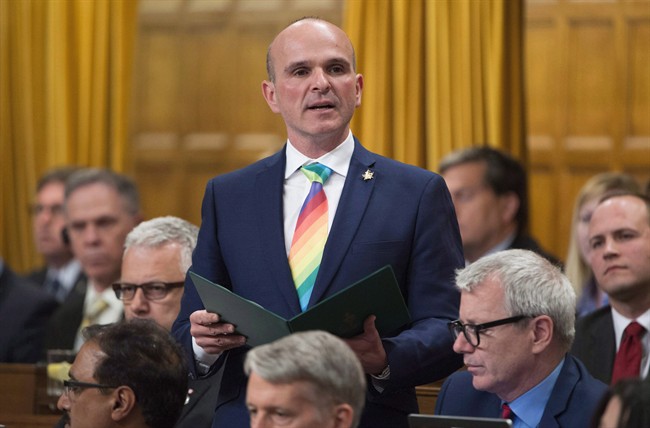Two weeks after Prime Minister Justin Trudeau delivered a tearful apology in the House of Commons to members of Canada’s LGBTQ community, a group of academics is raising red flags about legislation that was tabled that same day.

Bill C-66 sets out to right decades of historical legal wrongs, paving the way for thousands of gay, lesbian, bisexual and transgender Canadians to have their criminal convictions for gross indecency, buggery and anal intercourse erased from the public record.
WATCH: Trudeau apologizes to LGBTQ civil servants

In 2017, the government argued, many of those convictions are inconsistent with the Charter of Rights and Freedoms. Up to 9,000 people could see their criminal records expunged, provided they submit an application and it is approved.
Bill C-66 was designed to help back up the government’s official apology with concrete action, but a group of experts is arguing that in its haste, Ottawa has drafted a deeply flawed piece of legislation.
“There’s a lot of limitations,” said Gary Kinsman, professor emeritus of sociology at Laurentian University.
“It doesn’t cover what it needs to cover. And it’s also been done without any consultation with people in the LGBTQ, two-spirited communities. None of us who are historians and experts on the sexual history of Canada and the sexual regulation of same-sex sexuality have been consulted.”
READ MORE: Liberals table bill to erase gay sex convictions as part of LGBTQ apology
Kinsman is one of the four co-signatories to a scathing assessment of Bill C-66 released on Monday morning. The others were Patrizia Gentile, associate professor of human rights and sexuality studies at Carleton University, Tom Hooper, a lecturer in the department of history at York University, and Steven Maynard, permanent adjunct professor in the department of history at Queen’s University.
Their concerns come down to issues involving both clarity and scope.
For starters, the academics argue, Bill C-66 doesn’t say anything about the thousands of LGBTQ Canadians convicted of offences like vagrancy, indecent acts, obscenity and crimes linked to bawdy houses.
Historically, police often used bawdy house laws to raid bathhouses frequented by gay men and arrest owners, employees and hundreds of customers. In a single sweep in February 1981, officers in Toronto raided four city bathhouses and arrested more than 250 men. A violent protest ensued.
Similarly, Kinsman noted, people who worked for gay or lesbian publications or in LGBTQ bookstores were targeted under obscenity laws. Vagrancy charges were sometimes laid against men and women perceived to be wearing clothing that didn’t conform with their sex.
None of these people will have the opportunity to see their records expunged under Bill C-66, although the bill does provide for the addition of additional offences down the line through an order in council.
“All of those people actually thought they were going to be covered by this legislation and now they’re finding out that they’re not,” Kinsman said.
Asked about the omissions, Liberal MP and special advisor on LGBTQ issues Randy Boissonnault explained that the government is aware of the concerns, but offences like the ones linked to bawdy houses haven’t been ruled as running contrary to the Charter of Rights and Freedoms and remain part of the Criminal Code, which complicates matters.
“We’re looking at options,” he said of their exclusion.
“We’re going to see how the expungement bill as written goes through the Commons, and that’s why committee stage is an important opportunity to look at any possible amendments.”
Proving consent
Even if a person’s criminal conviction does qualify for expungement under the new law, a new array of questions surfaces.
Applicants will need to prove, for example, that their conviction was based on a consensual sexual encounter with an adult (defined as someone 16 or older). But what kind of documentation is required to prove that? What if the sexual partner is now dead, or can’t be found? What if that person claims the encounter wasn’t consensual?
And if the applicant needs to go searching through public records and incurs fees for access to those records, who pays?
Global News reached out to the Public Safety Canada on Monday for clarification but had not received a response by the time of publication.
READ MORE: Justin Trudeau differs from his father when it comes to apologizing for historic injustices
The bill does provide a way around some of these issues, however. If documentation can’t be provided after a “reasonable effort” has been made to obtain it (the bill doesn’t define what that means), the applicant can make a sworn statement that they meet the criteria to have their record wiped.
But again, Kinsman says this raises questions about how the Parole Board of Canada will adjudicate these situations and verify sworn statements.
“It does fall extremely short, and I think in some way they’re trying to rush it through to make it look like there was some substance behind the apology that really wasn’t there,” Kinsman said of the bill.
“It is a little bit of a slap in the face.”
The committee reviewing the bill was set to examine it later on Monday, after which it will be sent back to the House of Commons for a third reading. Amendments may be proposed.
Outside the House on Monday, NDP public safety critic Randall Garrison said the concerns raised about Bill C-66 are “valid.”
“I’m very disappointed to learn that the government did not consult widely before, as part of the drafting process,” he said. “People have waited decades to have their criminal records revised.”



Comments